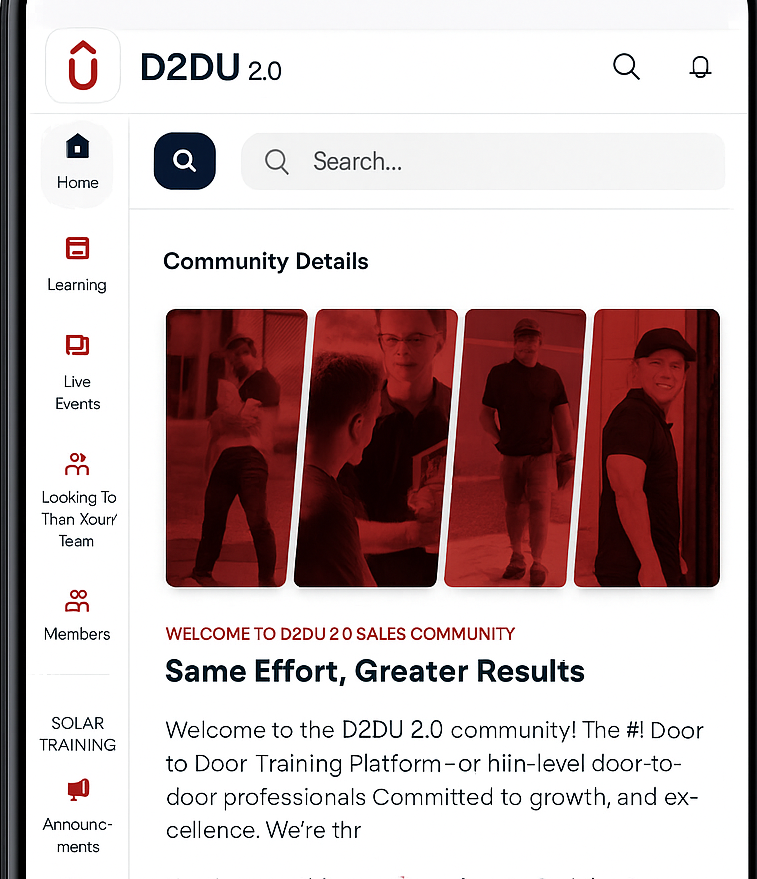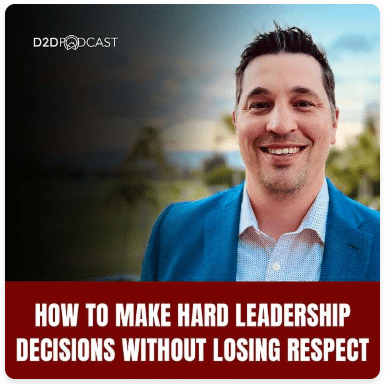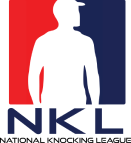KEY POINTS
- Sacrifice Before Scale: Running a business requires a level of personal sacrifice and financial discipline far beyond what's needed for sales leadership.
- The Managerial Divide: A leader must maintain clear separation from their team; being "one of the bros" will quickly erode respect and performance.
- Lead by Principles: The toughest decisions—like cutting a bad rep or an entire team—must be guided by what's best for the business as a whole, not individual emotion.
What does it truly take to leap from being a top-tier sales leader to becoming a successful business owner? It’s a transition that demands more than just grit; it requires a complete overhaul of your mindset, cash flow management, and willingness to make difficult choices. Many managers try to start their own companies and crash, blindsided by the harsh reality that personal sales skill doesn’t translate to operational success.
In this powerful episode of The D2D Podcast, host Hunter sits down with Brent Stevens, CEO of Knok and a long-time industry leader. Brent’s journey is a blueprint for resilience, spanning from his start knocking doors as a child to building one of Canada’s largest home services organizations with over $400M in contract value. He opens up about the brutal financial stress of launching a dealership and the personal growth required to run a massive organization. You can watch the full conversation on the D2D Experts YouTube channel or continue reading for a breakdown of his system for leadership and discipline.
Watch / Listen
Guest: Brent Stevens, CEO of Knok.
The Cost of Ownership: Sacrifice and Financial Discipline
Brent began his career in 2006 selling satellite door-to-door, then alarms, and eventually solar in the U.S. before returning to Canada in 2016 to found Knok. The transition from sales leader to owner was shocking, primarily due to the financial burden of running an alarm dealership.
1. Cash Flow is King
In the early stages, cash flow was a constant battle. Brent was responsible for paying reps and technicians upfront while waiting weeks or months for dealer funding. This required him to “sacrifice today’s luxury for tomorrow’s benefit”—a principle many new owners fail to grasp. He recalls times when his wife’s card would be declined at the store because every available dollar was being poured back into the business to buy equipment for the next day’s installs.
2. The Double Hit of Attrition
Brent highlights the financial peril of bad accounts: if a bad rep is paid, the customer then quits, and the dealer charges back the entire deal. The company is then out the cost of the equipment, the technician’s labor, and the rep’s commission (which often can’t be clawed back). He learned that this “heavy hit” often results in the business losing almost double the value of the original sale, making financial discipline and high-quality sales absolutely critical.
The Leadership Playbook: Maintaining Respect
Brent’s most challenging personal growth occurred when he realized his “one of the bros” approach as a manager was actively hurting his leadership.
1. The Managerial Divide
He learned that to earn respect, a manager must “separate yourself”. Being too comfortable with the team, engaging in all the pranks, or staying at the same hotel on blitzes erodes the necessary authority. The biggest personal lesson his wife pointed out was that he had to be different now; he couldn’t be one of the friends if he wanted people to follow him. This shift in behavior led to better team performance.
2. Business First: The Hardest Call
The most difficult lesson for Brent was learning to put the business first over the rep. He had to fire a rep he liked and protected after realizing that the “bad apple really rots the whole bag”. This taught him that his primary responsibility was to the livelihood of the entire company (hundreds of people), making hard decisions based on principles rather than personal emotion. To aid in this, he hired an HR team so he could offload the termination process and avoid getting too emotionally close to his people.
3. The Standardized Payout
A key recommendation for any sales manager moving to ownership is to establish a standardized pay scale immediately. Brent avoids “sweet deals” or “under the table deals” because they kill team morale and trust. This ensures every rep knows they are treated fairly and contributes to the overall stability of the company.
Hire fewer trainers, ship more wins
Build a sales machine that runs without you hovering

With over two decades of expertise, I have consistently propelled businesses towards transformation, reshaping existing ventures, and capitalizing on emerging trends. My extensive background spans across general management, new business development, product management, sales, and operations. My success lies in my ability to seamlessly navigate various roles, showcasing a proven track record in aligning business objectives with an innate talent for crafting effective strategies and executing comprehensive business plans.























